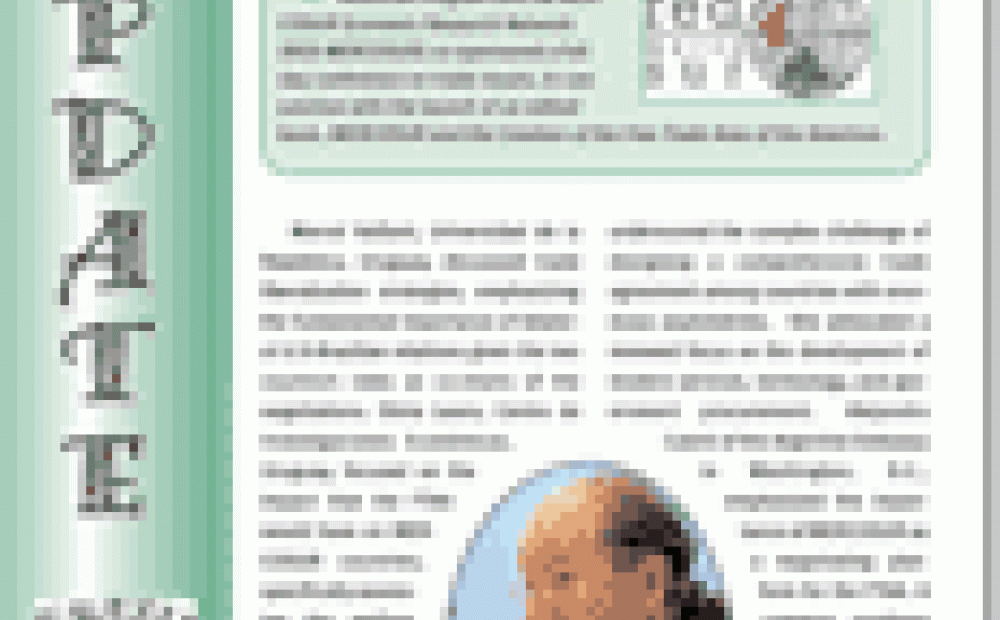MERCOSUR and the Creation of the Free Trade Area of the Americas

View this summary in publication format in Thinking Brazil Update (.pdf format).
On February 26, 2004, the Latin American Program and The MERCOSUR Economic Research Network (RED MERCOSUR) co-sponsored an all-day conference on trade issues, which coincided with the launch of an English language edition of a book on the topic.
Speakers on the opening panel discussed trade liberalization strategies, with Marcel Vaillant, Universidad de la República, Uruguay, presenting an overview of the aforementioned book. Valliant also emphasized the fundamental relevance of U.S. – Brazil bilateral relations in light of their current roles as co-chairs of the negotiations. Silvia Leans, Centro de Investigaciones Económicas, Uruguay, focused on the impact of the FTAA on MERCOSUR countries specifically assessing the welfare effects associated with the complete elimination of trade barriers.
A second panel discussed state perspectives, with Karen Lezny, U.S. Trade Representative, underscoring the complex challenge of designing a comprehensive trade agreement among countries with enormous asymmetries. She advocated a renewed focus on the development of modern services, technology, and government procurement. Alejandro Casiró, Argentine Embassy, Washington, D.C., emphasized the importance of MERCOSUR as a negotiating platform for the FTAA. A common southern market would represent more than improved trade for Argentina and its neighbors; it would be an extraordinary political and strategic accomplishment. Casiró also underscored the need to analyze the FTAA process in the context of other world trade agreements. Given the regional trade structure, agriculture continues to be the main issue for both Argentina and MERCOSUR in terms of market access, export subsidies, and economic sustainability. Building on Casiró's comments, Ambassador Rubens Barbosa, Brazilian Embassy, Washington, D.C., explained the strategic nature of MERCOSUR for Brazil, which favors a balanced and comprehensive FTAA. Barbosa observed that the United States had altered its approach by pursuing bilateral agreements instead of negotiating multilaterally with the 34 countries. He expressed additional concerns with the United Sates tabling critical issues such as agricultural subsidies, expressing the preference to discuss them only in the World Trade Organization (WTO). Barbosa also contrasted the strategies of former Brazilian President Cardoso - for whom Brazil's final participation was contingent on the outcome of the negotiations - with current President Luis Inácio "Lula" da Silva's commitment to step-by-step negotiation.
The third panel discussed sectoral perspectives, addressing the applied industrial dimension of the goods and services sector. Andrés López, Centro de Investigaciones para la Transformación, Argentina, focused on the petrochemical industry, highlighting the major increase of intra-industry and intra-regional in the sector. Julio Berlinski, Instituto Torcuato Di Tella, Argentina, stressed the importance of the relationship between goods and services, recommending further study of the effects of liberalization and deregulation on the competitiveness of trade goods. Discussing the differential patterns of openness in MERCOSUR countries, Sherry Stephenson, Trade Unit-Organization of American States, suggested increasing transparency in the service sector to allow more effective analysis of progress achieved. Finally, Salazar Xirinachs, Trade Unit-Organization of American States, championed importance of furthering sectoral research by increasing linkages between academic projects and practitioners.
During a final panel, Carol Wise, University of Southern California, addressed the political economy constraints of the negotiation, focusing on the U.S. position. Describing the asymmetries between the United States and MERCOSUR countries, Wise classified the relationship as one of "hegemonic obstructionism." Fernando Masi, Centro de Análisis y Difusión de la Economía, Paraguay, described the various positions of MERCOSUR countries vis-à-vis FTAA negotiations, presenting alternative scenarios to integration. For Masi, the success of more ambitious accords will depend on the ability of the United Sates and Brazil to agree on a mutually beneficial trade liberalization strategy as well as the capacity of Argentina and Brazil to redefine MERCOSUR's role in the larger regional integration scheme. Finally, Alvaro Ons, Universidad de la República, Uruguay, described the methodology that RED MERCOSUR had developed to identify the most problematic sectors under negotiation, using a selected set of goods to track welfare and political economy effects.
Hosted By

Latin America Program
The Wilson Center’s prestigious Latin America Program provides non-partisan expertise to a broad community of decision makers in the United States and Latin America on critical policy issues facing the Hemisphere. The Program provides insightful and actionable research for policymakers, private sector leaders, journalists, and public intellectuals in the United States and Latin America. To bridge the gap between scholarship and policy action, it fosters new inquiry, sponsors high-level public and private meetings among multiple stakeholders, and explores policy options to improve outcomes for citizens throughout the Americas. Drawing on the Wilson Center’s strength as the nation’s key non-partisan policy forum, the Program serves as a trusted source of analysis and a vital point of contact between the worlds of scholarship and action. Read more


Brazil Institute
The Brazil Institute—the only country-specific policy institution focused on Brazil in Washington—aims to deepen understanding of Brazil’s complex landscape and strengthen relations between Brazilian and US institutions across all sectors. Read more
